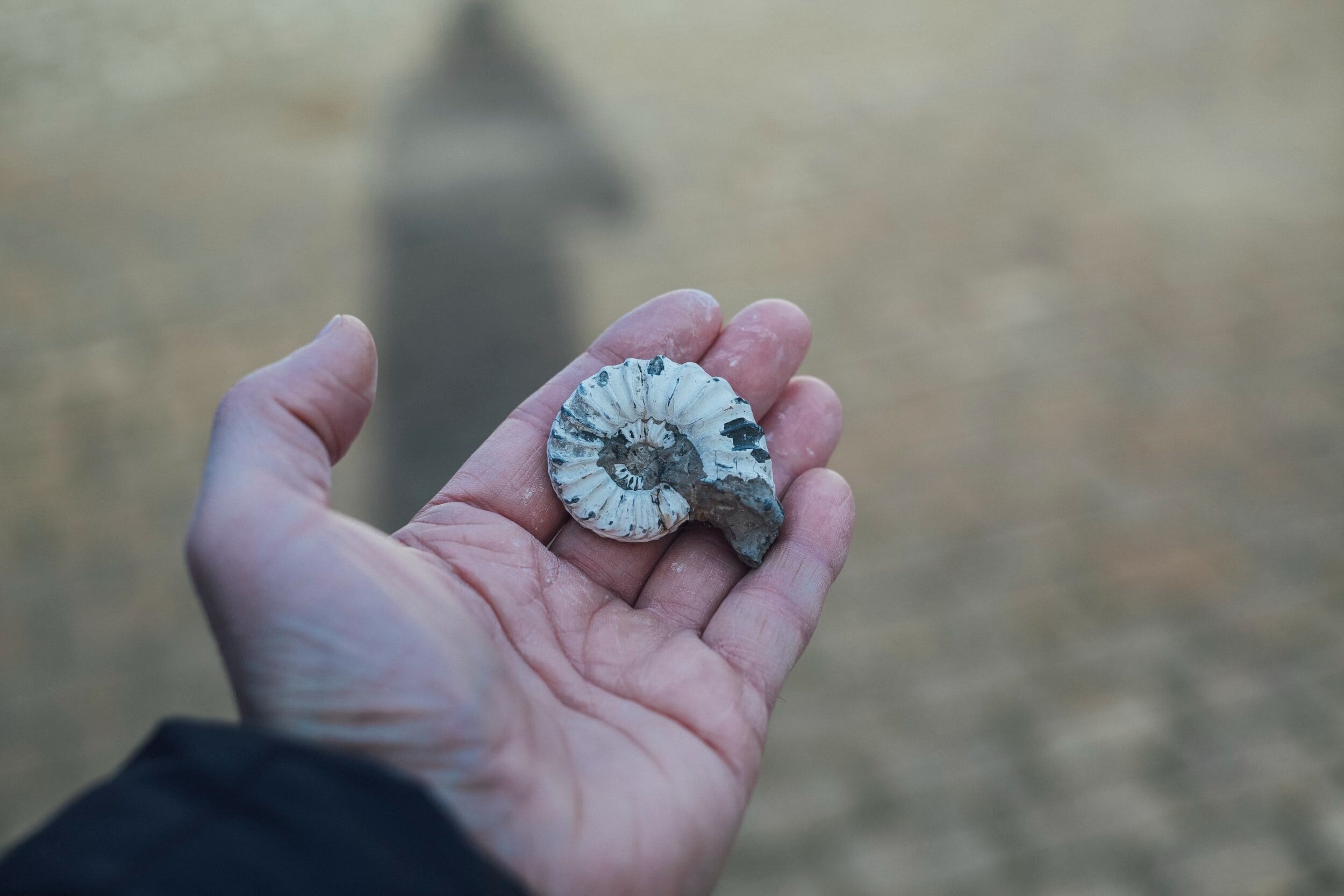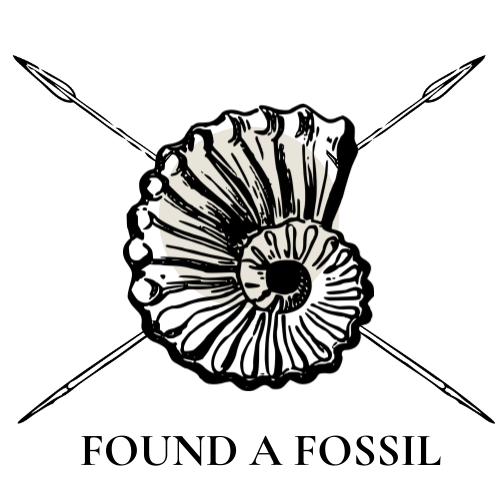
Fossil Finds
In every state and territory of Australia, there are different rules and requirements for fossil finds.
If you find a fossil or fossil site:
GET PERMISSION
RECORD THE DETAILS
COLLECT RESPONSIBLY
SEEK ADVICE

Know the rules.
The rules and regulations for fossil discoveries varies according to two main factors:
What state you are in
Who owns the land where you find the fossil (e.g., if it is your property, or a national park, or on crown land [like a public beach]
The Protection of Moveable Cultural Heritage Act 1986 also ensures that significant Australian fossils are not exported out of the country without the appropriate permits.
If you find a fossil or fossil site on your property, it won't affect your ownership of the land, but it is important to know what to do so we can preserve its history and possible scientific value. Farmers, miners, bushwalkers, and other members of the public have made important contributions to our knowledge of the history of life on Earth through their discovery of fossil sites.
Found a Fossil Guidelines
These Guidelines are also available as a:
Get Permission
If you find a fossil, you may need permission to collect it – this will depend on what land you are on, and what state you are in. Permission might be from the owner of private land or the local council. In some locations, such as national parks, you should not remove fossils. Other places might require a scientific licence or fossicking permit.
Record the Details
If you find a fossil, take photos of the specimen, where you found it, and record any other important details. This could be a GPS location, if there are any other fossils nearby, the date you found the fossil, and a sketch of the fossil.
Collect Responsibly
Fossils are relatively rare and can be fragile – handle them with care! Exercise restraint in the amount of material collected if there are multiple specimens, and be careful with what equipment you choose to use.
Seek Advice
Some of Australia’s most important fossils have been found by farmers, bushwalkers and other members of the general public – if you find something, we’d love to know!
For help with fossil identification, or to see if it’s a new or important find, you can contact a museum (see below).
Donate
If you do not want to keep your fossils, consider donating them to a museum, school, or university. Some museums will also allow you to store your collections with them, under the condition that they can display those items (you will still be the owner).
These guidelines were written in consultation with some of the resources listed below, as well as through consultation with Aboriginal peoples, Indigenous cultural heritage consultants, archaeologists, and palaeontologists who have preferred to stay anonymous. You can read more about the results of our expert consultation here.
State-by-State Legislation
The laws and governing bodies for fossil materials varies from state to state. Here we have provided some easy to navigate information for what rules may apply to you in each state, who you can contact if you find something, and extra resources where you can find more information.
Rules & Regulations
Fossils found on private land are the property of the landowner, leaseholder, or native title representative. Make sure you gain permission from the relevant owners to fossick or collect fossils on private land.
Fossils can be collected on crown land by means of fossicking and the finder is entitled to keep the specimens collected. On crown land leases, permission of the lessee needs to be obtained (Australian Museum 2021). Fossicking is defined by surface collection or manual digging only, with no use of machinery or large excavation permitted.
In National Parks, a person “may not carry or possess, interfere with, dig up, cut up, collect or remove for any purpose any fossil” (National Parks and Wildlife Act 1974)
Specific fossil sites may already be protected under Local Environmental Plans - check the NSW Legislation website.
Local councils may establish by-laws prohibiting collection of fossils, so check council websites or call them for details if you’re collecting on public lands such as road reserves and council owned areas.
On mining leases, including surface collecting on opal mining claims such as in Lightning Ridge, permission from the lease or claim owner is required before any collection can occur.
Who you can contact:
For fossil identification, excavation of finds, possible research opportunities for significant finds, and potential donations and storage, a museum is the generally the go-to authority for fossil finds.
Other Resources
Rules & Regulations
Fossils found on private land are the property of the landowner, leaseholder, or native title representative. Make sure you gain permission from the relevant owners to fossick or collect fossils on private land.
The Nature Conservation Act (2013) prohibits the damage, destruction, or removal of materials, including clay, gravel, rock, sand, soil or stone, from reserved areas.
Who you can contact:
For fossil identification, excavation of finds, possible research opportunities for significant finds, and potential donations and storage, a museum is the go-to authority for fossil finds.
Other Resources
Rules & Regulations
Fossils found on private land are the property of the landowner, leaseholder, or native title representative. Make sure you gain permission from the relevant owners to fossick or collect fossils on private land.
On crown lands, you need consent to collect from the Department of Environment, Land, Water and Planning
When fossicking, only surface collecting is allowed, no manual or mechanical digging is permitted.
Other Resources
Rules & Regulations
Fossils found on private land are the property of the landowner, leaseholder or native title representative. Make sure you gain permission from the relevant owners to fossick or collect fossils on private land.
On designated fossicking areas, you also need a fossicking licence as outlined in the Fossicking Act 1993. Under this act, the collection of vertebrate fossils is not allowed.
Once you have obtained your fossicking licence, you are allowed to manually dig for fossils, but the use of machinery for digging is not permitted. You can read more about the fossicking rules and responsibilities here.
Fossicking is not allowed in national parks and conservation parks, nor in State forests and timber reserves
Who you can contact:
For fossil identification, excavation of finds, possible research opportunities for significant finds, and potential donations and storage, a museum is the go-to authority for fossil finds.
Other Resources
Rules & Regulations
Fossils found on private land are the property of the landowner, leaseholder, or native title representative. Make sure you gain permission from the relevant owners to fossick or collect fossils on private land.
Known fossil beds are protected as heritage places under the NT Heritage Act 2011.
Fossicking on vacant crown land is acceptable or on declared fossicking areas.
You are not allowed to collect vertebrate fossils, or fossick on protected fossil sites. Fossicking in National Parks and other protected areas is also not allowed.
Who you can contact:
For fossil identification, excavation of finds, possible research opportunities for significant finds, and potential donations and storage, a museum is the go-to authority for fossil finds.
Other Resources
Rules & Regulations
Fossils found on private land are the property of the landowner, leaseholder, or native title representative. Make sure you gain written permission from the relevant owners to fossick or collect fossils on private land.
You will need a Miner’s Right to collect any fossils. Only manual digging is allowed, with mechanical digging not permitted.
No collecting is to be made on Crown Reserves (e.g. National Parks, State Forest areas, regulated Geoheritage Reserves) without prior written approval from the relevant State or Federal Government agencies. The only exceptions to this are those State Reserves listed as having a Common, Public Utility or Mining purpose (Geological Survey of WA).
Who you can contact:
For fossil identification, excavation of finds, possible research opportunities for significant finds, and potential donations and storage, a museum is the go-to authority for fossil finds.
Other Resources
Rules & Regulations
In South Australia, all fossils, regardless of where they were found (i.e., on private land, in national parks, etc.), are considered to be the property of the crown. Fossils cannot be collected on Crown land (this includes leasehold land) without lawful authority (subject to terms of the lease).
Consent can be obtained from the crown to collect fossils for research purposes with a Scientific Research Permit.
Who you can contact:
For fossil identification, excavation of finds, possible research opportunities for significant finds, and potential donations and storage, a museum is the go-to authority for fossil finds.
Other Resources
Rules & Regulations
Fossils found on private land are the property of the landowner, leaseholder, or native title representative. Make sure you gain permission from the relevant owners to fossick or collect fossils on private land.
If you are not in an area marked out for fossicking, you will need a fossicking permit for crown lands.
Uncommon fossils must be referred to Mineral Resources Tasmania
Who you can contact:
For fossil identification, excavation of finds, possible research opportunities for significant finds, and potential donations and storage, a museum is the go-to authority for fossil finds.
Other Resources
The information provided here is a guide only. Apart from the specific legislative acts and websites references, this information is primarily based on:
Thorn, K. 2021. How to hunt fossils responsibly: 5 tips from a professional palaeontologist. The Conversation. [online]. Available: https://theconversation.com/how-to-hunt-fossils-responsibly-5-tips-from-a-professional-palaeontologist-156861. [Accessed 14-Nov.-2021].
Percival, I. 2014. Protection and Preservation of Australia’s Palaeontological Heritage. Geoheritage 6, 205-216. DOI: 10.1007/s12371-014-0106-z.
This information was last updated 14/11/2021.
FACT CHECK: While we strive to provide accurate and honest information that is based on current literature and resources, we may not always get it right. If you see something that doesn’t look right, please contact us!
Literature we Love!
If you wanted to do some extra reading of your own about Australian fossils, Aboriginal and Torres Strait Islander archaeology, or heritage laws, we’ve added some literature that might be a good place to start!



